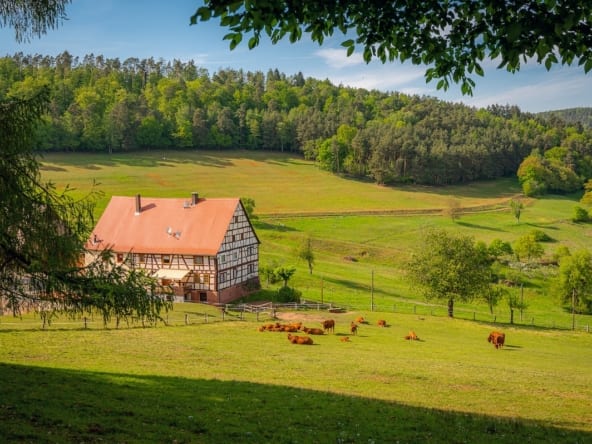The following review is from SurvivalRealty.com co-founder Jonathan Rawles
I recently had opportunity to review Crawford Gribben‘s Survival and Resistance in Evangelical America, subtitled “Christian Reconstruction in the Pacific Northwest.” I appreciated the commentary and insights offered by his work. The focus of the book is conservative and evangelical relocation to the inland northwest, specifically the American Redoubt. As blurbed on the book jacket:
Over the last thirty years, conservative evangelicals have been moving to the Northwest of the United States, where they hope to resist the impact of secular modernity and to survive the breakdown of society that they anticipate. These believers have often given up on the politics of the Christian Right, adopting strategies of hibernation while developing the communities and institutions from which a new America might one day emerge. Their activity coincides with the promotion by prominent survivalist authors of a program of migration to the “American Redoubt,” a region encompassing Idaho, Montana, parts of eastern Washington and Oregon, and Wyoming, as a haven in which to endure hostile social change or natural disaster and in which to build a new social order.
Mr. Gribben, a university professor in Belfast, based his work on extensive reading and interviews with leaders and thinkers involved in migration movements to the inland northwest.
Outline
Gribben identifies the roots of the migration to the inland northwest in the works of R. J. Rushdoony and Gary North, who advocated for relocation and preparedness from the 1960s through 1990s, with a focus on relocation to survivable areas including the northwest. This focuses on the development of the American Redoubt concept in the last decade:
Despite the best guesses of participants, and movement profiles in newspapers of record, on one knows how many individuals should be identified with the migration. But if millions of hits on survivalblog.com are any indication, or if the achievement of New York TImes bestseller status is any kind of clue, the widespread consumption of the very idea of the Redoubt, and its representation in popular culture, may be as significant as its lived experience. The media of the Redoubt creates a virtual “imagined community” that large numbers of its participants find compelling. – p. 18
The author digs deep into the intellectual underpinnings of this relocation, identifying it in the contrast of pessimistic and optimistic perspectives on the future. Common to both is a concern for major societal disruption in the near future. While some views are pessimistic about the long term prospects, others see whatever challenges may arise only as part of the journey towards a brighter future.
The book also addresses the perspectives towards governance common to the migration movement. Although deep-seated distrust of an intrusive government is apparent, he also notes that the primary means of change are personal and relational, focusing on the growth, flourishing, and independence of individuals and communities.
Gribben also discusses the growth of homeschooling and private schools, and the role of alternative and mainstream media in contributing to the growth of a distinct and self-sustaining movement. Here he notes that the sweep of the movement is not so overtly political as it is cultural.
Interestingly enough, SurvivalRealty.com was mentioned in the first chapter:
Some wanted to live visibly in communities, building businesses on Main Street, while others preferred isolation, pursuing the ideals of a new agrarianism. […] Some had purchased defensible off-grid property through businesses with names like “American Redoubt Realty” or “Survival Realty,” preparing to respond to violence, while others were expecting to live in peace. – Gribben p. 28
I would also note that the survival retreat concept is not based only on concerns of violence, but a desire to set up one’s home for long-term sustainability and growth. However, it’s certainly gratifying to see the impact we’ve made.
Strengths
Gribben gives voice to a wide variety of figures both current and past. His treatment does not only focus on the loudest or most “newsworthy” voices, nor does it overly sensationalize fringe elements. The overall tone of the work is fair, genuinely curious, and insightful.
Especially valuable to those seeking top understand the American Redoubt and other migrations, Gribben’s in-depth discussion of its intellectual heritage is invaluable. He draws attention to influential but overlooked thinkers, and his extensive references would provide an invaluable starting point for further research.
Weaknesses
In his even-handedness, Gribben occasionally adopts terminology and interpretations from secondary sources without critical assessment or rebuttal from his interviewees. While understandably outside the scope of his work, some allowance for more counterpoint would have been valuable. And to be fair, he does extensively disabuse the notion that there is a monolithic movement or coordinated leadership within it.
Gribben focuses heavily on the inland northwest, and for good reason. The most prominent migration movements are to this region, and it a paradigmatic example. However, this paradigm is readily replicated, and similar feeling is also driving migration to Texas, Appalachia, and other regions, as well as to rural communities across the United States.
Although released this year, the book heavily draws on field work from 2015 and shortly after the 2016 election. The dramatic uptick in relocation away from cities in 2020 is not reflected. In large part, this seems to be a pragmatic movement, largely driven by political, social, and economic factors in the age of lockdowns.
Takeaway
Gribben’s work provides an insightful exploration of the current conservative migration movements. It does live up to its stated promise to “examine the origins, evolution, and cultural reach of this little-noted migration and considers what it might tell us about the future of American evangelicalism.” While far from a final word, it would provide an excellent starting place for anyone who is personally or professionally curious about the topic.
Jonathan Rawles is the author of Survival Retreats & Relocation, and a co-founder of SurvivalRealty.com and Survival Realty Brokerage Services.
This website participates in the Amazon Services LLC Associates Program. The program enables us to earn money by linking to amazon.com and affiliated websites.




